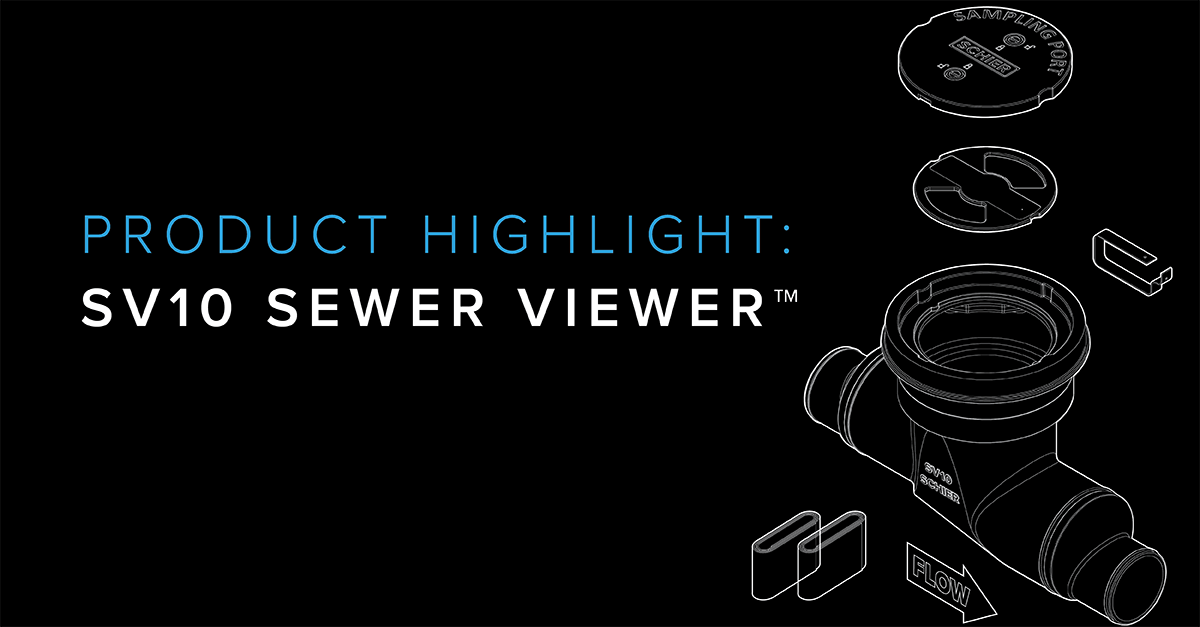March 2, 2022

Some jurisdictions require the use of an external sampling port as a means to inspect the quality of effluent water following a grease interceptor. If your project is in one of these jurisdictions, Schier’s SV10 Sewer Viewer™ is a best-in-class (and price) solution.
 The "What" and the "Why"
The "What" and the "Why"A sampling port is a device installed downstream of a grease interceptor or other sources of wastewater pretreatment (like an oil/water separator or solids interceptor) with the purpose of providing access for visual inspection and/or sampling. A sample can be collected by inserting a bottle through the cover opening and grabbing the water flowing through from the inlet to the outlet. Sampling ports make it easy for water pretreatment officials to collect and analyze a sample without having to enter the restaurant, as the sampling port is usually installed outside the facility at street level.
The SV10 is a smaller alternative to most sampling ports on the market and is a more affordable option that can be installed with any size grease interceptor. The unit is just over two feet in length, with a cover that’s just under one foot in diameter, and the entire unit weighs only nine pounds. The product is made in the USA of seamless, rotationally-molded polyethylene.
 The SV10 includes 4" and 6" fitting options, making it convenient to modify at the jobsite, eliminating the possibility of expensive jobsite substitutions. While it comes from the factory ready to connect to 4" drain lines, you can simply cut off the 4" connections at the pre-marked cut lines to install with 6" connections instead.
The SV10 includes 4" and 6" fitting options, making it convenient to modify at the jobsite, eliminating the possibility of expensive jobsite substitutions. While it comes from the factory ready to connect to 4" drain lines, you can simply cut off the 4" connections at the pre-marked cut lines to install with 6" connections instead.
The inlet and outlet are offset, with the outlet two inches lower to allow for a “perfect” sample grab. We say “perfect” because sample bottles fit into the sump shape to achieve high-quality horizontal grab samples even at high burial depths. A level sampling port, on the other hand, makes it more difficult to fill the sampling bottle.
 When installing the SV10 below grade, an 8" corrugated pipe can be used as a riser to bring the system to grade. Schier’s FCR10 riser is designed exclusively for use with the SV10 and comes with the appropriate couplings and butyl mastic tape to easily connect up to three 33" tall risers for a maximum of height of 97". The topmost FCR10 riser can be cut in the field to match your exact burial depth.
When installing the SV10 below grade, an 8" corrugated pipe can be used as a riser to bring the system to grade. Schier’s FCR10 riser is designed exclusively for use with the SV10 and comes with the appropriate couplings and butyl mastic tape to easily connect up to three 33" tall risers for a maximum of height of 97". The topmost FCR10 riser can be cut in the field to match your exact burial depth.
The SV10 comes standard with an H-20 traffic rated cover, Safety Star™ for entry restriction, and Schier’s lifetime guarantee.
A sampling port is only required by certain jurisdictions and is not necessary otherwise. Currently, there is no standard or provision within the Uniform Plumbing Code that governs the installation of a sampling port. Rather, the code gives power to the Authority Having Jurisdiction (AHJ) to approve all such submissions. Before you purchase the SV10, verify with Schier or your local code to see whether it meets local requirements. It may look something like this verbiage found in the Southlake, TX code:
“Sample port design:
The sample port will be installed immediately following the grease interceptor and prior to the confluence of the interceptor outfall line with other sewer lines.
The floor of the sample port shall not be below the flow grade line.
The opening of the sample port must be no less than 10" diameter from ground level to water level.
The lid must be traffic-rated if located in a traffic area.
The sample port must not be located in any storage area or an area that will prevent readily available access.
The sample port may not be located inside the building unless prior approval has been granted by the Public Works Department.”
*Fats, Oils, and Grease (FOG) Manual, Southlake Public Works, Revised Jan. 2020.
When a sampling port is not explicitly required but the need for visual inspection arises, Schier’s Great Basin™ grease interceptors include open top inlet and outlet diffusers to provide adequate visibility of influent and effluent wastewater quality.
Benefits for the Restaurant Owner:
Affordable solution
Lifetime warranty
Safety Star™ standard
Benefits for the Installer:
Ability to switch pipe connection size between 6" and 4"
Install above grade, below grade, indoors or outdoors
Install with Schier’s FCR10 riser for deep burials
Lightweight and easy to maneuver on jobsite
Benefits for the Jurisdiction/Inspector:
Offset inlet and outlet allows for grabbing the “perfect” sample
Compatible LabGrab™
Note: In our previous blog we wrote about the importance of grease interceptor maintenance to increase the longevity of your interceptor storage, which can prevent backups and grease pass through. It’s also important to clean and maintain your sampling port so all samples are accurate. Regularly rinse your sampling port to remove any built up residue.